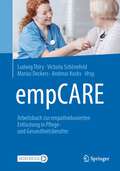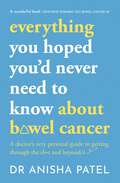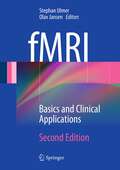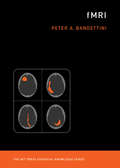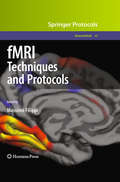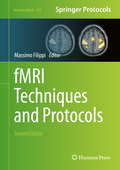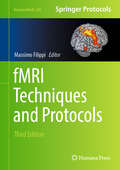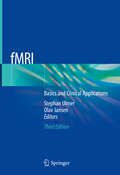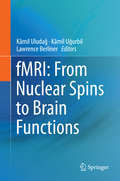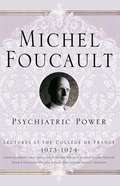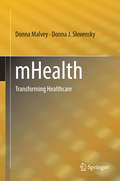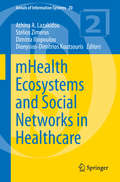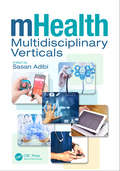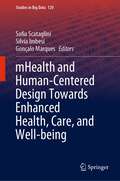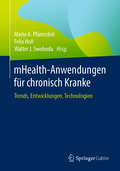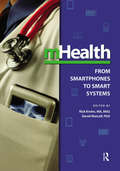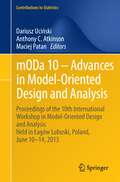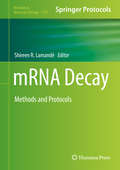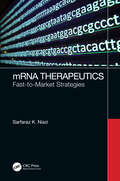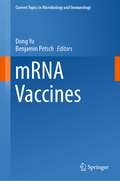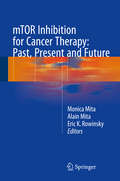- Table View
- List View
eHealth Applications: Promising Strategies for Behavior Change (Routledge Communication Series)
by Nancy Grant Harrington Seth M. NoareHealth Applications: Promising Strategies for Behavior Change provides an overview of technological applications in contemporary health communication research, exploring the history and current uses of eHealth applications in disease prevention and management. This volume focuses on the use of these technology-based interventions for public health promotion and explores the rapid growth of an innovative interdisciplinary field. The chapters in this work discuss key eHealth applications by presenting research examining a variety of technology-based applications. Authors Seth M. Noar and Nancy Grant Harrington summarize the latest in eHealth research, including a range of computer, Internet, and mobile applications, and offer observations and reflections on this growing area, such as dissemination of programs and future directions for the study of interactive health communication and eHealth. Providing a timely and comprehensive review of current tools for health communication, eHealth Applications is a must-read for scholars, students, and researchers in health communication, public health, and health education.
eHealth, Care and Quality of Life
by Fabio Capello Antonio Gaddi Marco MancaThe debate over eHealth is alive as never before. Supporters suggest that it will result in dramatic innovations in healthcare, including a giant leap towards patient-centered care, new opportunities to improve effectiveness, and enhanced wellness and quality of life. In addition, the growing market value of investments in health IT suggests that eHealth can offer at least a partial cure for the current economic stagnation. Detractors counter these arguments by claiming that eHealth has already failed: the UK Department of Health has shut down the NHS National Program for IT, Google has discontinued its Health flagship, and doubts have arisen over privacy safeguards for both patients and medical professionals. This book briefly explains why caregivers, professionals, technicians, patients, politicians, and others should all consider themselves stakeholders in eHealth. It offers myth-busting responses to some ill-considered arguments from both sides of the trench, in the process allowing a fresh look at eHealth. In addition, it describes how the technical failures of previous eHealth systems can be avoided, examines the legal basis of eHealth, and discusses associated ethical issues.
eHealth: Legal, Ethical and Governance Challenges
by Carlisle George Diane Whitehouse Penny DuquenoyThis publication identifies and discusses important challenges affecting eHealth in the EU and North America in the three areas of law, ethics and governance. It makes meaningful contributions to the eHealth discourse by suggesting solutions and making recommendations for good practice and potential ways forward. Legal challenges discussed include issues related to electronic medical records, telemedicine, the Internet and pharmaceutical drugs, healthcare information systems and medical liability. Ethical challenges focus on telehealth and service delivery in the home, Web 2.0 and the Internet, patient perceptions and ethical frameworks. Governance challenges focus on IT governance in healthcare, governance and decision-making in acute care hospitals, and different models of eHealth governance. The publication provides useful support materials and readings for persons active in developing current understandings of the legal, ethical and governance challenges involved in the eHealth context.
empCARE: Arbeitsbuch zur empathiebasierten Entlastung in Pflege- und Gesundheitsberufen
by Victoria Schönefeld Andreas Kocks Ludwig Thiry Marius DeckersEmpathisch und zugleich selbst gesund bleiben, das ist das Ziel des empCARE-Trainings. Unter der Leitung des Institutes für Psychologie an der Universität Duisburg Essen wurden in einem dreijährigen vom BMBF geförderten Projekt exemplarisch Pflegende am Universitätsklinikum Köln, am Universitätsklinikum Bonn und beim Intensivpflegedienst Aaron aus Köln darin trainiert, Empathie strukturiert gegenüber anderen und gegenüber sich selbst reflektierter einzusetzen, um psychischen Belastungen präventiv vorzubeugen. Die präventive Wirkung auf die Gesundheit der Teilnehmerinnen und Teilnehmer konnte in der begleitenden Studie nachgewiesen werden. Noch ein Jahr nach dem Seminar zeigt sich ein messbar verbesserter Umgang mit Empathie. Damit verbunden ist eine Abnahme von Belastungssymptomen wie zum Beispiel Burnout und Depressivität.Neu ist, dass empCARE die Emotionen und Bedürfnisse der Beschäftigten der Gesundheits- und Sozialberufe selbst in den Blick nimmt. Sie lernen mit den Anforderungen in der Interaktionsarbeit besser zurecht zu kommen und gleichzeitig die eigene Gesundheit und Berufsmotivation zu stärken. Im Unterschied zu anderen Empathietrainingsprogrammen geht es nicht um die simple Verstärkung von Empathie gegenüber einer anderen Person, sondern um einen reflektierten Umgang mit der eigenen Empathie und die Stärkung der Selbstfürsorge. Das Training ist ein Beitrag zur Gesundheitsprävention der teilnehmenden Personen und reduziert Belastungsfaktoren, die aus der Interaktion mit Klientinnen und Klienten resultieren.
endoCANNABINOIDS
by Roger G Sorensen Mary E. Abood Nephi StellaThis book is intended as a scientific resource for cannabinoid researchers carrying out animal and human experiments, and for those who are interested in learning about future directions in cannabinoid research. Additionally, this book may be of value to investigators currently working outside the field of cannabinoid research who have an interest in learning about these compounds and their atypical cannabinoid signalling. This book provides insight into the potential medical application of cannabinoids and their therapeutic development for the treatment of human disease.
everything you hoped you’d never need to know about bowel cancer: A doctor’s very personal guide to getting through the sh*t and beyond
by Anisha Patel'THIS BOOK COULD SAVE YOUR LIFE' Lorraine Kelly1 in 15 men. 1 in 18 women. Every year in the UK 43,000 people are newly diagnosed with bowel cancer. Dr Anisha Patel is one of them. Young, fit, and married to a consultant gastroenterologist and bowel cancer screening specialist, in 2018 she was diagnosed with Stage 3 bowel cancer. Despite being a family doctor, Anisha had no idea what would come next. With the benefit of hindsight, and after first-hand experience, she understands now that the diagnosis is just the beginning, that treatment can be physically and mentally overwhelming, and that the hard work really starts when the treatment ends. Drawing on her own experience and her medical expertise, as well as that of specialists in the field, Anisha's book is an essential companion for anyone facing a cancer diagnosis. She outlines what to expect at each stage, from diagnosis, through treatment and into the 'new normal' that awaits, with practical advice and emotional guidance for every step of the way. Hers is not the only voice; here you will find a chorus of individuals who share their own lived experiences of bowel cancer and its aftermath, in the hope that they, too, can navigate you through the eye of the cancer storm, to thrive in the life beyond. Powerful and personal, this is a life-saving book for a life-changing diagnosis, and a testament to human resilience and the enduring power of hope.
fMRI
by Stephan Ulmer Olav JansenFunctional MRI (fMRI) and the basic method of BOLD imaging were introduced in 1993 by Seiji Ogawa. From very basic experiments, fMRI has evolved into a clinical application for daily routine brain imaging. There have been various improvements in both the imaging technique as such as well as in the statistical analysis. In this volume, experts in the field share their knowledge and point out possible technical barriers and problems explaining how to solve them. Starting from the very basics on the origin of the BOLD signal, the book covers technical issues, anatomical landmarks, presurgical applications, and special issues in various clinical fields. Other modalities for brain mapping such as PET, TMS, and MEG are also compared with fMRI. This book is intended to give a state-of-the-art overview and to serve as a reference and guide for clinical applications of fMRI.
fMRI (The MIT Press Essential Knowledge Series)
by Peter A. BandettiniAn accessible introduction to the history, fundamental concepts, challenges, and controversies of the fMRI by one of the pioneers in the field. The discovery of functional MRI (fMRI) methodology in 1991 was a breakthrough in neuroscience research. This non-invasive, relatively high-speed, and high sensitivity method of mapping human brain activity enabled observation of subtle localized changes in blood flow associated with brain activity. Thousands of scientists around the world have not only embraced fMRI as a new and powerful method that complemented their ongoing studies but have also gone on to redirect their research around this revolutionary technique. This volume in the MIT Press Essential Knowledge series offers an accessible introduction to the history, fundamental concepts, challenges, and controversies of fMRI, written by one of the pioneers in the field. Peter Bandettini covers the essentials of fMRI, providing insight and perspective from his nearly three decades of research. He describes other brain imaging and assessment methods; the sources of fMRI contrasts; the basic methodology, from hardware to pulse sequences; brain activation experiment design strategies; and data and image processing. A unique, standalone chapter addresses major controversies in the field, outlining twenty-six challenges that have helped shape fMRI research. Finally, Bandettini lays out the four essential pillars of fMRI: technology, methodology, interpretation, and applications. The book can serve as a guide for the curious nonexpert and a reference for both veteran and novice fMRI scientists.
fMRI Techniques and Protocols
by Massimo FilippiAs fMRI technology has provided invaluable insights into the mechanisms through which the human brain works in healthy individuals and in patients with different neurological and psychiatric conditions, the study of brain function and even the monitoring of the effects of treatment have become more effective and efficient. In fMRI Techniques and Protocols, an international assemblage of renowned scientists and physicians provide the background needed to plan and design new studies in order to advance our knowledge of the physiology of the normal human brain and its change following tissue injury. With sections focusing on basic principles of fMRI, its application to measure brain function, clinical applications, and glimpses into the future of fMRI development, the volume condenses this ample, varied field into one user-friendly compendium of information and techniques. Comprehensive and cutting-edge, fMRI Techniques and Protocols is an ideal guide for all those who wish to continue expanding this dynamic and ever-growing field of research.
fMRI Techniques and Protocols
by Massimo FilippiAs fMRI technology has provided invaluable insights into the mechanisms through which the human brain works in healthy individuals and in patients with different neurological and psychiatric conditions, the study of brain function and even the monitoring of the effects of treatment have become more effective and efficient. In fMRI Techniques and Protocols, an international assemblage of renowned scientists and physicians provide the background needed to plan and design new studies in order to advance our knowledge of the physiology of the normal human brain and its change following tissue injury. With sections focusing on basic principles of fMRI, its application to measure brain function, clinical applications, and glimpses into the future of fMRI development, the volume condenses this ample, varied field into one user-friendly compendium of information and techniques. Comprehensive and cutting-edge, fMRI Techniques and Protocols is an ideal guide for all those who wish to continue expanding this dynamic and ever-growing field of research.
fMRI Techniques and Protocols (Neuromethods #220)
by Massimo FilippiThis third edition volume expands on the previous edition with updates on the latest methodological aspects of fMRI and achievements made through the applications to the study of central nervous system functioning in the clinical field. The chapters in the book are organized in four parts: Part One talks about the basic knowledge for the understanding of the technical aspects of fMRI. Part Two describes the main findings obtained from the application of fMRI to study brain system function of healthy individuals. Part Three explores clinical findings obtained from the use of fMRI to assess the role of brain plasticity in major neurological and psychiatric conditions. Part Four presents novel approaches for the integration of fMRI data with measures of damage assessed using structural MR techniques and the use of fMRI to image spinal cord function. In the Neuromethods series style, chapters include the kind of detail and key advice from the specialists needed to get successful results in your laboratory.Cutting-edge and comprehensive, fMRI Techniques and Protocols, Third Edition provides clinicians and researchers with a &“user-friendly&” summary of the field, and helps them plan and carry out successful studies.
fMRI: Basics and Clinical Applications
by Stephan Ulmer Olav JansenThis book, now in its revised and updated third edition, provides a state of the art overview of fMRI and its use in clinical practice. Experts in the field share their knowledge and explain how to overcome diverse potential technical barriers and problems. Starting from the very basics on the origin of the BOLD signal, the book covers technical issues, anatomical landmarks, methods of statistical analysis, and special issues in various clinical fields. Comparisons are made with other brain mapping techniques and their combined use with fMRI is also discussed. Existing chapters have been updated and new chapters have been added in order to account for new applications, further clinical fields and methods, e.g. resting state fMRI. Based on the clinical focus, this book will be of great value for Neuroradiologists, Neurologists, Neurosurgeons but also Researchers in Neuroscience.
fMRI: From Nuclear Spins to Brain Functions
by Lawrence Berliner Kâmil Uludağ Kâmil UğurbilThis volume explores the revolutionary fMRI field from basic principles to state-of-the-art research. It covers a broad spectrum of topics, including the history of fMRI's development using endogenous MR blood contrast, neurovascular coupling, pulse sequences for fMRI, quantitative fMRI; fMRI of the visual system, auditory cortex, and sensorimotor system; genetic imaging using fMRI, multimodal neuroimaging, brain bioenergetics and function and molecular-level fMRI. Comprehensive and intuitively structured, this book engages the reader with a first-person account of the development and history of the fMRI field by the authors. The subsequent sections examine the physiological basis of fMRI, the basic principles of fMRI and its applications and the latest advances of the technology, ending with a discussion of fMRI's future. fMRI: From Nuclear Spins to Brain Function, co-edited by leading and renowned fMRI researchers Kamil Ugurbil, Kamil Uludag and Lawrence Berliner, is an ideal resource for clinicians and researchers in the fields of neuroscience, psychology and MRI physics.
le Psychiatric Power Lectures at the Collège de France, 1973-1974
by Michel Foucault Graham Burchell Arnold I. Davidson Alessandro Fontana Jacques Lagrange Francois EwaldIn this new addition to the Coll#65533;ge de France Lecture Series Michel Foucault explores the birth of psychiatry, examining Western society's division of 'mad' and 'sane' and how medicine and law influenced these attitudes. This seminal new work by a leading thinker of the modern age opens new vistas within historical and philosophical study.
mHealth
by Donna Malvey Donna J. SlovenskyThis book defines the phenomenon of mHealth and its evolution, explaining why an understanding of mHealth is critical for decision makers, entrepreneurs and policy analysts who are pivotal to developing products that meet the collaborative health information needs of consumers and providers in a competitive and rapidly-changing environment. The book examines trends in mHealth and discusses how mHealth technologies offer opportunities for innovators and entrepreneurs, those who often are industry first-movers with regard to technology advancement. It also explores the changing dynamics and relationships among physicians, patients, insurers, regulators, managers, administrators, caregivers and others involved in the delivery of health services. The primary focus is on the ways in which mHealth technologies are revising and reshaping healthcare delivery systems in the United States and globally and how those changes are expected to change the ways in which the business of healthcare is conducted. mHealth: Transforming Healthcare consists of nine chapters that addresses key content areas, including history (to the extent that dynamic technologies have a history), projection of immediate evolution and consistent issues associated with health technology, such as security and information privacy and government and industry regulation. A major point of discussion addressed is whether mHealth is a transient group of products and a passing patient encounter approach, or if it is the way much of our health care will be delivered in future years with incremental evolution to achieve sustainable innovation of health technologies.
mHealth Ecosystems and Social Networks in Healthcare
by Athina A. Lazakidou Stelios Zimeras Dimitra Iliopoulou Dionysios-Dimitrios KoutsourisThis book provides a principled approach to classification using the available data in a model which combines information from the social network and the healthcare models. It presents studies from leading researchers and practitioners focusing on the current challenges, directions, trends and opportunities associated with healthcare delivery systems and their supporting wireless and mobile health technologies. mHealth Ecosystems and Social Networks in Healthcare is divided into two parts. Part I covers the area of mHealth Ecosystems. Chapters include topics on adoption of cloud based mHealth services, the socio-economic impact of mHealth, as well as self-management of health and disease. In Part II, Social Networks in Healthcare are highlighted. Chapters cover social media and patient support, virtual knowledge sharing and knowledge management and also web-based applications in health care. Ultimately this book is an excellent source of comprehensive knowledge and literature on the topics of mobile health ecosystems and social networks in healthcare.
mHealth Multidisciplinary Verticals
by Sasan AdibiAn in-depth overview of the emerging concept; Mobile Health (mHealth), mHealth Multidisciplinary Verticals links applications and technologies to key market and vendor players. It also highlights interdependencies and synergies between various stakeholders which drive the research forces behind mHealth. The book explores the trends and directions w
mHealth and Human-Centered Design Towards Enhanced Health, Care, and Well-being (Studies in Big Data #120)
by Sofia Scataglini Gonçalo Marques Silvia ImbesiThe book examines the current state of mHealth and Human-Centered Design (HCD) initiatives toward health, care, and well-being. The present surge in interest in improving people's quality of life is creating new prospects for the development of innovative design solutions aimed at enhancing living conditions. The combination of emerging user needs and opportunities provided by recent innovative mHealth technologies enables research institutions, stakeholders, and academia to design new solutions to promote well-being, health, and care, thereby improving the quality of life of people of all ages. The book analyzes and discusses the most innovative services, products, and systems in the healthcare field. This strategy is in line with the concept of ambient assisted living or enhanced living environment, which focuses on the comfort and health of specific categories of users.This book covers several topics highlighting the importance of involving end-users in the design of innovative solutions in digital health care, and design considerations of mobile healthcare applications.Furthermore, the covered topics are described in their current applications in relevant fields focusing on the design of smart solutions, such as biomonitoring systems, activity recognition tools, smart living environments, physical autonomy, and virtual assistance.This editorial project is addressed to academics, designers, engineers, and practitioners in health care who want to promote cooperation between academia, stakeholders, and research institutions.
mHealth-Anwendungen für chronisch Kranke: Trends, Entwicklungen, Technologien
by Mario A. Pfannstiel Felix Holl Walter J. SwobodaDie Digitalisierung im Gesundheitsmarkt verändert und erweitert die Möglichkeiten Menschen mit chronischen Erkrankungen zu helfen, weshalb sie einen immer größeren Stellenwert für Diagnostik und Versorgung einnimmt. Der Sammelband gibt einen Überblick über neueste, innovative mHealth-Lösungen, die als tägliche Begleiter bei Prävention, Diagnostik und Therapie zum Einsatz kommen. Praxisbeispiele zeigen Entwicklungen und die Inanspruchnahme von mHealth-Anwendungen durch Patienten und klinisches Personal auf und es werden zahlreiche für die Forschung relevante Fragen behandelt. Damit richtet sich dieses Buch sowohl an Ärzte, Patienten, Entwickler und weitere Praktiker, die Mobile-Health-Anwendungen nutzen und zur Weiterentwicklung beitragen sowie an Wissenschaftler und Dozenten mit den Schwerpunktfächern Gesundheitsmanagement, Informationstechnologie und Medizin.
mHealth: From Smartphones to Smart Systems (HIMSS Book Series)
by Mas, Metcalf David Rick Krohn Ma, Mas, Metcalf David Rick Kroh MamHealth: From Smartphone to Smart Systems provides a high level and comprehensive survey of the emergence of mobile technology healthcare. This book looks beyond the already-popular devices and apps associated with mHealth, exploring the major role this technology could play as healthcare steers inexorably toward an architecture
mODa 10 – Advances in Model-Oriented Design and Analysis
by Maciej Patan Dariusz Ucinski Anthony C. AtkinsonThis book collects the proceedings of the 10th Workshop on Model-Oriented Design and Analysis (mODa). A model-oriented view on the design of experiments, which is the unifying theme of all mODa meetings, assumes some knowledge of the form of the data-generating process and naturally leads to the so-called optimum experimental design. Its theory and practice have since become important in many scientific and technological fields, ranging from optimal designs for dynamic models in pharmacological research, to designs for industrial experimentation, to designs for simulation experiments in environmental risk management, to name but a few. The methodology has become even more important in recent years because of the increased speed of scientific developments, the complexity of the systems currently under investigation and the mounting pressure on businesses, industries and scientific researchers to reduce product and process development times. This increased competition requires ever increasing efficiency in experimentation, thus necessitating new statistical designs. This book presents a rich collection of carefully selected contributions ranging from statistical methodology to emerging applications. It primarily aims to provide an overview of recent advances and challenges in the field, especially in the context of new formulations, methods and state-of-the-art algorithms. The topics included in this volume will be of interest to all scientists and engineers and statisticians who conduct experiments.
mRNA Decay: Methods and Protocols (Methods in Molecular Biology #1720)
by Shireen R. LamandéThis detailed volume explores the latest methods that can be used to probe mRNA decay pathways and identify mRNA-binding protein targets as well as miRNA targets. Subjects include metabolic labelling and RNAseq methods for determining RNA decay rates, approaches for discovering RNA-binding protein targets, bioinformatics, miRNA targets and novel components of the miRNA-directed decay pathway, and recently developed approaches for studying nonsense-mediated mRNA decay, among other areas. Written for the highly popular Methods in Molecular Biology series, chapters include introductions to their respective topics, lists of the necessary materials and reagents, step-by-step, readily reproducible laboratory protocols, and tips on troubleshooting and avoiding known pitfalls. Authoritative and practical, mRNA Decay: Methods and Protocols serves as an ideal guide for molecular biologists, geneticists, and developmental biologists with an interest in understanding how normal development and tissue homeostasis is regulated and how these processes are perturbed in inherited and acquired diseases.
mRNA Therapeutics: Fast-to-Market Strategies
by Sarfaraz K. NiaziThis book is the most comprehensive and complete treatise on nucleic acid therapeuticproducts, including mRNA vaccines, their manufacturing, formulations, andtesting for safety and efficacy. Details include cGMP-compliant manufacturing andregulatory filing steps. A new concept of “biosimilar” mRNA vaccine is presentedto secure fast approval of copies of mRNA vaccines. Projections of financial plansto establish RNA manufacturing facilities are provided, along with details of supplychain management. Finally, the future of nucleic acid products in gene therapy andother newer applications is presented, along with a perspective that all new vaccineswill be the nucleic acid type that will further provide first-time prevention of autoimmunedisorders. It is projected that both big pharma and start-ups will enter this field,and we can expect significant additions to our drug armamentarium soon.
mRNA Vaccines (Current Topics in Microbiology and Immunology #440)
by Dong Yu Benjamin PetschThe formulation and the technological advancements in RNA biology, chemistry, stability, and encapsulated delivery systems that have enabled the development of fully synthetic mRNA vaccines are discussed in this volume. The applications of the mRNA technology is covered, focusing on infectious diseases but also touching on other indications, such as immunotherapies and molecular therapies. Potent and long-lasting immune responses observed in animal models, encouraging data from early human clinical studies, together with the success of two mRNA-based COVID-19 vaccines support the use of mRNA-based vaccination as an attractive alternative to conventional vaccine approaches. Consequently, the development progress of the technology, particularly on production, capabilities, and clinical development is reviewed. Topics on safety, regulatory issues, and possible challenges to the mRNA vaccination approach round off this book. Thanks to their high potency, the prospect for generic, low-cost manufacturing processes, and entirely synthetic nature, the future for mRNA vaccines is highly promising. Importantly, mRNA vaccines have the potential to minimize the time between pathogen identification and vaccine release with a huge impact on public health. As the mRNA-based vaccination technology has been progressing rapidly, the book is intended to be an end-to-end review series, covering everything from basic RNA biology and preclinical studies to the manufacturing strategy, clinical development and regulatory approval. It provides established RNA researchers and developers with updates on the latest advancements in the field and allows for a quick but comprehensive overview of this transformative technology, its application, and future potential.
mTOR Inhibition for Cancer Therapy: Past, Present and Future
by Monica Mita Alain Mita Eric K. RowinskyThis book describes the challenges involved in developing mTOR inhibitors for cancer treatment, starting with an in-depth examination of their molecular mechanism of action, with emphasis on the class side-effects, efficacy and mechanisms of resistance, as well as on promising novel directions for their development, including novel compounds and rational combinations with other anti-neoplastic drugs. Over the last 10 years, inhibitors of mTOR have emerged as a major class of anticancer drugs. Two rapamycin analogs are currently approved for the treatment of renal cell carcinoma, and it is estimated that a variety of other tumor types could benefit from mTOR inhibition, with numerous clinical trials (including pivotal registration trials) already underway. Second-generation small-molecule inhibitors of the pathway have also shown promise in terms of their superior tolerability and efficacy and are undergoing extensive clinical evaluation, with an estimated 30+ compounds currently under evaluation.

